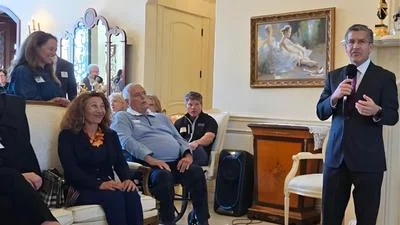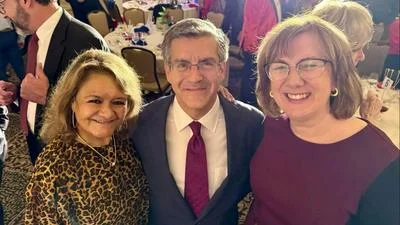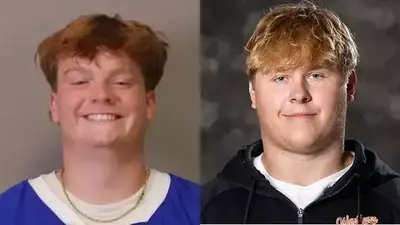Trustee Wendy Dunnington | Village of Arlington Heights Website
Trustee Wendy Dunnington | Village of Arlington Heights Website
Village of Arlington Heights Committee-of-the-Whole met April 29
Here are the minutes provided by the committee:
I. CALL TO ORDER
II. PLEDGE OF ALLEGIANCE
III. ROLL CALL
President Hayes and the following Trustees responded to roll: LaBedz, Schwingbeck, Bertucci, Shirley, Baldino, Dunnington and Grasse. Trustee Tinaglia was absent.
Also present were: Randy Recklaus, Jorge Torres, Nick Pecora, Elliot Eldridge and Becky Hume.
IV. NEW BUSINESS
A. Discussion Regarding Potential Rental Housing Inspection Program
Mr. Recklaus said the Rental Housing Inspection Program being presented is a concept at this point. Staff wanted to get a read from the Board if this is the direction they would like to take. He cautioned the Board that any new program like this would put pressure on existing on funding and may require new revenue sources.
Mr. Eldridge presented the proposed Rental Housing Inspection Program which is designed to protect and promote public health, preserve the safety and welfare of the residents, reduce crime and nuisances, and encourage landlords to maintain and improve the quality of their housing. There are potentially three phases of the program. Phase 1 would initiate inspections of rental units within multi-family housing buildings.
Currently, the Village charges a license fee of $13 per rental unit in multifamily housing developments. Inspections today are limited to the common areas of buildings and are performed by Fire Inspectors who are civilians within the Building and Life Safety Department. From January – October of 2023, the Village received $53,640.99 in fees.
In looking at neighboring communities with rental inspection programs, the Village of Palatine’s was chosen as a model due to similarities within the communities. Their model has three inspectors who inspect 25% of their rental units each year. Arlington Heights has 8,342 rental units, 4,845 are within multifamily rental housing developments. The rest are condos or homes which are rented privately. The cost of adding three inspectors (which would cover 1,211 units) would be approximately $312,000 a year.
To help offset the cost of the program, rental license fees would be increased to $26 per unit or $126 per building, whichever is greater. Reinspection fees for non-compliant landlords could also be charged. It is anticipated the Village would receive $125,970 in total revenue, an increase of $64,985 over the current revenue collected. These fees would cover 20% of the projected cost of the program. Fine revenue would further offset these costs. The remainder of the costs would be covered by the General Fund.
Chief Pecora said the program would require training and public education among landlords and tenants. Landlords would be required to periodically attend crime-free training with the Police and BLS departments. They would learn the warning signs of bad tenants and how to make their property more secure. Chief Pecora noted that new legislation being considered by the State would negate local Crime Free Rental Housing programs.
The program would also allow for the collection of Affordable Housing Data which has been a request of the Housing Commission. Landlords would be educated about why the data is important and how the Village plans to use it.
Prior to any inspections, landlords would receive a Rental Inspection checklist so that they and their tenants are aware of what is being reviewed. Landlords could then voluntarily achieve compliance in advance of an inspection and provide tenants peace of mind.
President Hayes asked for clarification on the kinds of units being rented. Mr. Torres explained that condos are included as some owners rent them out. Owners who have 3 or more units are required to get a license. 4 units or more within a building are considered multi-family. The Village has approximately 8,400 rental units, 4,800 are in multi-family complexes or buildings. Condos and homes that are rented are not tracked; the data was obtained from the census.
Trustee LaBedz asked if the property owner or management company obtained the license. Mr. Torres said the property owner is on file, sometimes they pay for the license, sometimes the management company does, but they work that out between themselves. She asked if the checklist was available. Mr. Eldridge said the check list is in the property management code. Mr. Recklaus said the program would give renters access to the information. Inspections would be scheduled and all would be made aware of what the standards are.
Mr. Recklaus explained some of the impetus for this program resulted after a fire occurred in a complex where the tenant was in a hoarding situation. The unit had not been checked for many years. After the fire, the landlord looked at other units and there were many issues. The program would put expectations up front and create accountability.
Trustee Grasse expressed interest in pursuing the program and asked when the fees were established. The answer was prior to 2020. She said she would like for landlords to provide a place where packages could be delivered safely. The issue of stolen packages has been brought to her by residents. She asked about the checklist being available to property owners. Mr. Torres said he will make the ICC website available to them, which is where the checklist is.
Trustee Grasse continued, saying she would prefer a program with more carrots than sticks. Perhaps fees could be reduced when the checklist is completed? She would prefer the burden be on the property owners, by making tenants aware, they might bring issues forward to their landlords. Another suggestion was to lengthen the intervals of inspections for those who are compliant. Mr. Recklaus replied some tenants might be fearful to bring issues forward as their rent might be increased forcing them out of their home, external accountability protects the renters.
Trustee Bertucci said he was in favor of the program. There are some complexes that have bed bugs, mice and hoarders. He noted that the Residences has the most calls for assistance. Would this reduce the number of calls and/or crime? Chief Pecora said that is the goal. Most of the calls to the Residences are for people in crisis, not crime. We have a good relationship with the property manager there. Today there are over 80 people placed there by advocacy groups, some of whom, have substance or mental health issues. Mr. Recklaus said we are not proposing crime free legislation at this time. This program is to prevent landlords from cutting corners regarding maintenance and to have a check on the tenants. Trustee Bertucci suggested rethinking the financing so as not to impact the General Fund.
Trustee Schwingbeck asked how much time would be spent in a unit. Mr. Torres said inspectors would be expected to be in 12-15 units a day. Trustee Schwingbeck said he would like to cover more of the costs within the program and asked if the current Fire Inspectors could help. Mr. Recklaus said the Fire Inspectors do not have time to inspect units as they inspect all commercial buildings. However, the addition of rental inspectors might free up the Fire Inspectors. Trustee Schwingbeck asked what Phase 2 would entail. Mr. Recklaus said the program could be scaled to include Airbnb’s. Trustee Schwingbeck said he would like a handle on single-family home rentals within neighborhoods.
Trustee Baldino asked if the licenses are annual. The answer was yes. He said he was interested in pursuing the program because of the safety benefits. He cautioned that increasing fees would result in increasing rents. Many families are already struggling and adding costs would exacerbate that problem.
Trustee Dunnington asked if the checklist included water leaks, peeling paint and lead paint. Mr. Eldridge said it covers paint, electrical and water issues, but not lead paint. Trustee Dunnington asked if issues would be reported, specifically regarding occupancy numbers. Mr. Recklaus said Federal case law makes it difficult to regulate the number of people in a unit. That is not being proposed. Trustee Dunnington asked what kind of notice residents would receive. Mr. Eldridge said three days, a maintenance manager would be present to provide access to the unit. Each inspection would take 15-30 minutes. Residents cannot request annual inspections but can file a code complaint. Trustee Dunnington asked if an owner requested financial assistance to make repairs, would the Village assist? Mr. Recklaus said a different revenue stream would need to be identified by the Board.
Trustee Shirley said he would be in favor of the program, but it needs to pay for itself. Either increase the cost per unit, or lower the frequency of inspections. He asked why crime prevention rental ordinances were being challenged. Chief Pecora said using law enforcement against specific income groups suggests certain populations are being targeted. Sanctions are often related to the number of calls and can result in eviction. Mr. Recklaus added that a neighbor might cause trouble for another neighbor for reasons not crime related. Not all calls are the same. The State is looking at this closely and looking to remove background checks. Mr. Recklaus said the Village does not currently require background checks for renters, but many landlords do.
President Hayes asked if the Village had legal authority to do inspections. Mr. Recklaus said we would make it a condition of the license. Most leases give the landlord the authority to inspect units. This is widespread in Illinois. Mr. Torres said licenses with inspection requirements are universal.
Trustee LaBedz asked if there would be a pool of candidates to perform the inspection job. Mr. Torres said yes, the last posting for a permit technician received 140 applications. He was able to narrow the pool to 10 people with municipal experience who had used our software.
Trustee Bertucci asked if the first responders report violations now. The answer was no, but they can refer issues to Health or BLS. Also, if they are on the premises, they can call Health or BLS to the scene if they see an issue as they do in Hotels. Trustee Bertucci agreed with Trustee Shirley regarding the cost of the program. He said he did not want homeowner’s taxes to pay for it.
Mr. Recklaus summarized that the Board was in support of the program, but would like to find ways for it to support itself financially if possible.
Trustee Dunnington said she would not want the cost to be incurred by the renters either. Trustee Grasse concurred.
Michael Daley, a representative of Main Street Properties, addressed the Board saying the industry faces a steep affordability crisis. In their experience, broadly expansive inspection ordinances, combined with burdensome fees, is not the equation for success. He urged the Village adopt a policy that targets those properties that do not act in the best interest of the health and safety of residents. They have worked on local crime free housing and nuisance property regulations statewide. The State of Illinois passed a law several years ago adding arrest records as a protected class in the real estate transactions. Any local ordinance that forces a housing provider to remove or evict a tenant for any reason other than a conviction creates a possible human rights violation under state law. He expressed concern that by implementing or enforcing this kind of program, the Village opens itself up to federal fair housing violations, human rights violations and disparate impact claims. His company respects the intent of proactively curbing criminal activity and they hope to be a resource in this endeavor so as not to restrict a landlord’s ability to lease their property to the community at large or make it harder for domestic violence survivors, people living with a disability, and families impacted by the justice system to obtain and enjoy a home.
Melissa Cayer quoted the preamble of the Constitution. She noted the right of the people to be secure in their persons, houses, papers, and affects against unreasonable searches and seizures. These rights shall not be violated and no warrants shall be issued but upon probable cause supported by both their information particularly describing the place to be searched and imprisoned or things to be seized.
President Hayes thanked staff for the presentation saying we'll have many other discussions to come on this but we thank you for your good work so far.
V. OTHER BUSINESS
VI.PUBLIC COMMENTS
VIIA. DJOURNMENT
Trustee Baldino moved to adjourn at 8:00 p.m. Trustee Schwingbeck seconded the motion. The motion carried and the meeting was adjourned.
https://arlingtonheights.novusagenda.com/agendapublic/DisplayAgendaPDF.ashx?MinutesMeetingID=1774






 Alerts Sign-up
Alerts Sign-up